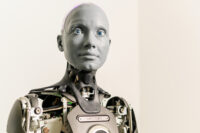Literary critic and author Christopher Hitchens’ “God is not Great: How Religion Poisons Everything” (2007) reached number one on the New York Times bestseller book list and biologist Richard Dawkins’ “The God Delusion” (2006) has sold over 1.5 million copies and has been translated into 31 languages. God and religion, it seems, have become popular and highly profitable targets.
Religion has always generated controversy, particularly among those of differing faiths or no faith whatsoever, and invoking God undoubtedly adds a quality of self-righteousness to an otherwise non-religious struggle. Many a tyrant has thus cloaked himself in sanctimonious religious trappings; accordingly, rotten politics has all too often been conflated with religion. With the passage of time sordid political history is forgotten and it’s the religious history alone that appears bloodstained and ugly. To consider politics and religion as if they were historically distinct and separate is to ignore the reality of interdependent power relationships, and this incorrect view inevitably leads to distorted conclusions. A list of human atrocities committed in the name of religion as evidence of religion’s evil ignores that such deeds were committed by ordinary people and the institutions created by them. The blame has thus been wrongly laid too easily and too often.
It is upon organized religion that Hitchens and Dawkins heap their greatest scorn. However, it is only by state sanction that institutions of organized religion combined with national wealth and military strength have historically been deployed. The Popes of old may have moved hearts and minds with words or edicts, but it was their economic and geo-political influence that moved armies – armies comprised of men. Today’s lone zealot who commits suicide in the name of faith while destroying others is a likely instance of a confused and disordered messianic delusion, not the fault of religion itself. To blame religion for the confusion and madness of people is like blaming the sun for those who get sunburned.
There exists a modern distinction between religion and spirituality, and perhaps the current anti-religious penchant is buttressed by the ease with which so many feel simply spiritual. As is so often the case, our language blurs distinctions rather than clarifying them, and defining “spiritual” or “religious” inevitably provokes us into gray areas. Nowadays, the term “spiritual” is associated with a myriad of beliefs and activities, such as the intercession of angels, the healing power of crystals, past lives, clairvoyance, divination and the power of chanting. “Religion,” on the other hand, while incorporating spiritual components, is more closely associated with the mainstream institutional practices of organized faiths with large memberships that maintain churches, temples, mosques and synagogues.
Ultimately, definition and affiliation matter far less than the specifics of practice. Calling ourselves spiritual yet holding to no framework of specific values, ethics or behavior risks embracing spirituality as mere affectation. However, acknowledging our interdependence with others and honoring and elevating decency, compassion and benevolence as an intentional daily activity are deeply meaningful practices, as is appreciating that sincere forms of religion and spirituality all point to the human yearning for meaning and connection. Indeed, the possibility of profound personal transformation and growth matters greatly.
Finally, no matter how well they turn a phrase nor how many books they sell, neither Hitchens nor Dawkins can diminish the value of our powerful human longing for transcendence.
We welcome your feedback. For general feedback or to contact one of our columnists, please visit the Columns page at www.sonomasun.com.
Bashing God for fun and profit
More from Public CitizenMore posts in Public Citizen »




